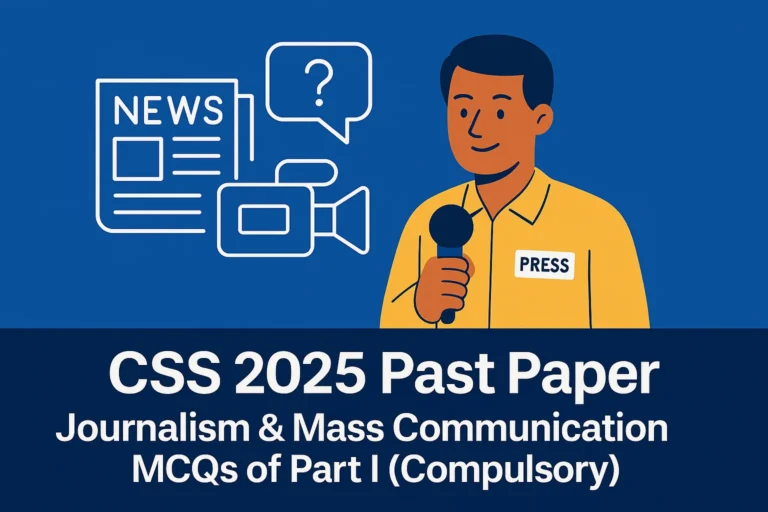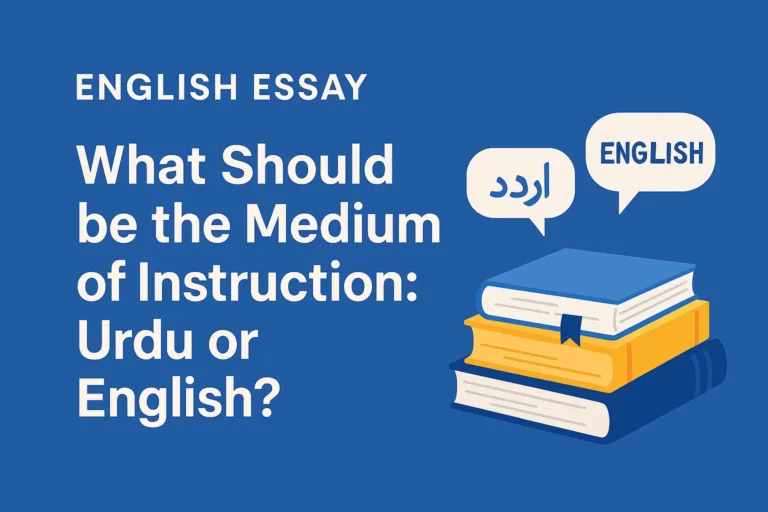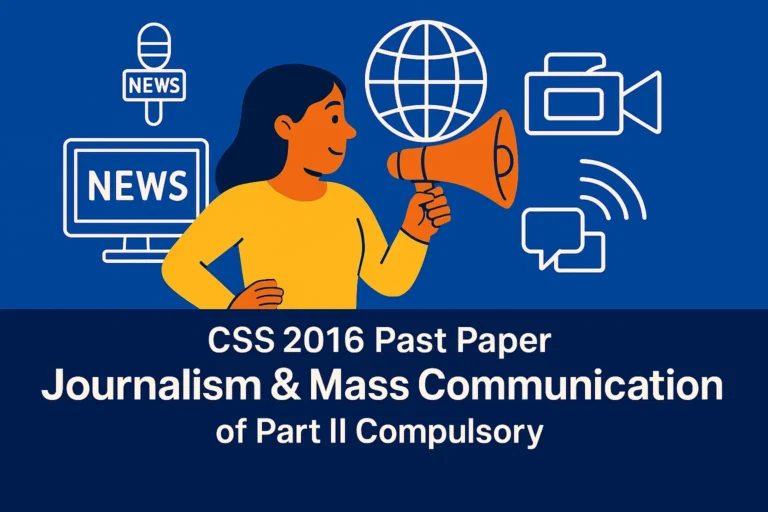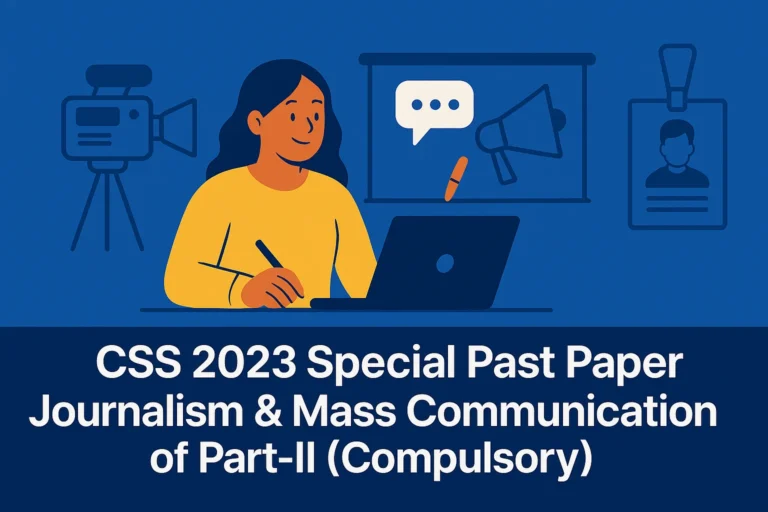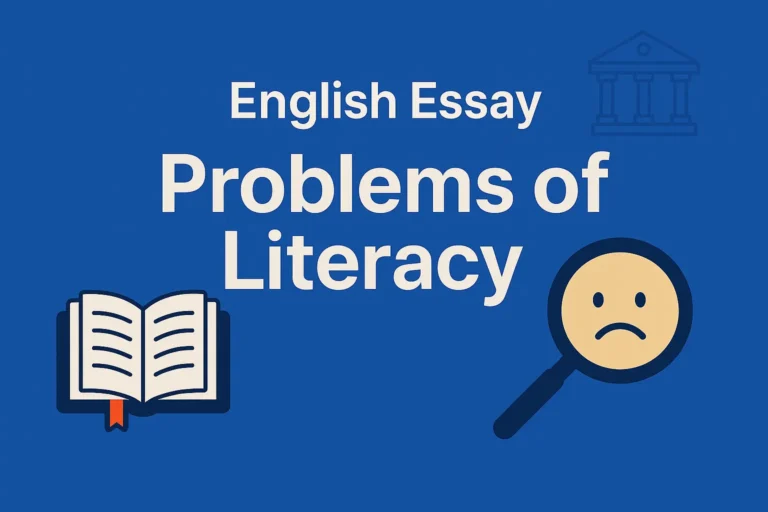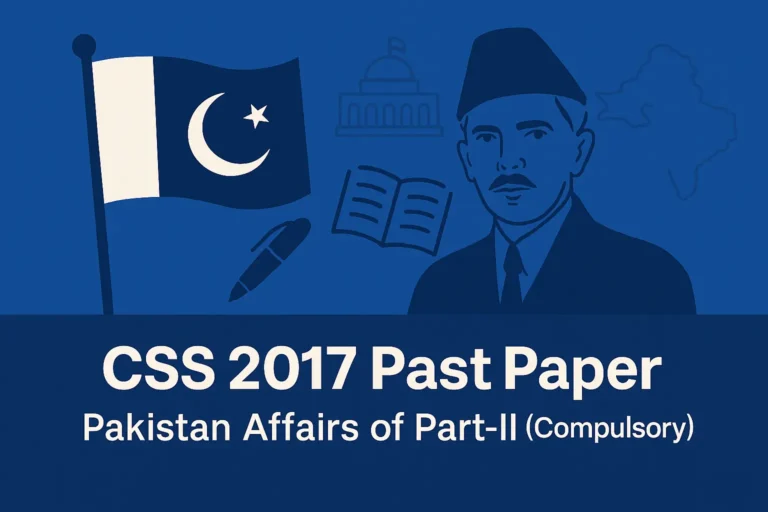Personalisation of Politics in Pakistan
(English Essay – CSS & PMS)
Outline
- Introduction
- Politics as a Profession in the West
- Contrast with Pakistan’s Political Scenario
- Politics as a Game of Personal Interests
- Role of Institutions and Corruption
- Politics Reserved for Privileged Classes
- Military Coups and Splits in Political Parties
- Politicians as Slaves of Interests
- Oscar Wilde’s Analogy: The Happy Prince
- The Impact of Personalisation on Policies
- Dynastical Democracy and Dominant Families
- Undemocratic Party Structures
- Conclusion
Introduction
Politics is considered to be a sort of religion in Western countries. Politics is thought to be an honourable profession, as it aims at serving the people. People adopt politics as a profession because they wish to serve the people by resolving their genuine problems of varied nature.
Politics as a Profession in the West
Political parties are well-organised, which, after thoroughly testing the credentials of people, allow them to become members to carry out their manifestos. Only enlightened persons given to the national cause become members of political parties. They place national welfare before themselves. They are not much concerned with their personal motives while entering the arena of politics.
Contrast with Pakistan’s Political Scenario
Things are different in Pakistan. Politicians belonging to different political parties have their personal axes to grind. There are some honourable exceptions, which do not have any personal fishy motive to promote. However, a majority of politicians are subject to the promotion of personal vested interests.
They fight elections to swell their fishy motives at the cost of the national interests. They bring themselves before the nation. Through their personal influence, they obtain import-export licenses to increase their economic interests. They get licenses to set up different industries. They run buses on different routes in the country.
In short, they get access to the national economic assets and grow rich over time. Their ‘Self’ is dominant in every political and economic activity, and national interests recede in the background.
Politics as a Game of Personal Interests
That is an account of personalisation of politics, which typically suits the feudocracy, industrialocracy, and bureaucracy in Pakistan.
Politics is a game with certain well-defined rules. When objective rules are discarded and replaced with personal ones, it is a case of personalisation of politics. Politics in this context emerges as the handmaid of politicians. Politicians do not care about the rules of politics, which do not suit them when they are out to advance their typical interests and override the interests of the nation.
Role of Institutions and Corruption
When they come into power, they begin to play upon their interests, caring little about the rules of the game. The rules are subordinated to their personal whims. That is how favouritism is encouraged.
In national institutions like the PIA, the recommended candidates are accommodated at the cost of merit. Sometimes, candidates not wanted are absorbed in PIA-like organisations, thereby putting the finances of those under a severe strain. It leads to over-staffing, which causes deficits to grow, imperilling the viability of the institutions.
Politicians in the ruling position can thus subvert rules to achieve personal objectives. This tendency has done incalculable damage to Pakistan.
Above all, there are cases of corruption, recently reported by the electronic media, according to which billions of rupees have gone into the pockets of corrupt elements. The corruption is the result of sidelining the rules and regulations and enforcing personal rules to yield uncalled-for gains to the ‘chosen few’ being in the ruling position.
Politics Reserved for the Privileged Classes
Personalisation of politics means depriving the nation of the benefit of merit, without which Pakistan cannot survive in the real sense.
Politics is reserved for the privileged classes in Pakistan. The feudal landlords, the industrialists, plus the retired civil and military bureaucrats comprise the power axis in Pakistan. The privileged classes take part in the national elections whenever these are held.
They can afford to contest the elections by virtue of their power, money, and influence. These classes rule the roost in Pakistan and can secure advantages for themselves. The morality of these classes revolves around self-aggrandizement.
Military Coups and Splits in Political Parties
In the event of a military coup, many MNAs and MPAs switch over their loyalty to the military dictator. They throw the principles to the wind to gain personal mileage. The history of Pakistan shows that a new political party is formed, consisting of turncoats, that throws its weight behind the military dictator.
It happens because of the personalisation of politics on the part of the feudals, the industrialist MNAs. This class stands for making hay while the sun shines. Principles are not found in the dictionary of this class.
When Field Marshal Ayub Khan came to power through a coup, the Muslim League was split into Convention and Council factions. When Musharraf dislodged the civil government of Nawaz Sharif through a coup, the Nawaz League was splintered into factions. A new League (Quaid) came into being, which was the recipient of peculiar favours of the military dictator.
Politicians as Slaves of Interests
Many MNAs feared punishment if they did not side with the dictator. They were breathless before the dictator. They were elected representatives but had not the cheek to differ with the policies of the ruthless military dictator.
They were a part of the policies of Musharraf, and now some of them repent and feel sorry for endorsing the repressive approach of the general.
Oscar Wilde’s Analogy: The Happy Prince
It is like saying, in the words of Ghalib:
“He forbade tyranny after my assassination. Look! How he repents now.”
Politicians thus are slaves of their interests. They play the game in a personalised manner to promote their vested interests. In an environment like this, real democracy cannot flourish and thrive.
One is reminded of Oscar Wilde’s short story “The Happy Prince”. During his lifetime, the Prince lived in a palace where human worry and suffering were not allowed to enter.
Like Tennyson’s Lady of Shallot, he lived in a palace of mirrors, and he was cut off from the problems of human beings. After his death, his statue, studded with jewels and diamonds, was perched on the top of a hill. His lifeless eyes could now detect human suffering in myriad forms.
The Prince dispossessed himself of the jewels and diamonds through a swallow, which carried out the command of the Prince to render service to the needy.
Our leaders like to replace the old statues with their own, indicating a high degree of selfishness and personal greed.
The Impact of Personalisation on Policies
Greed gets into the politics of the rulers (not all), which itches them all the time to discard the principle of fair play and adopt a principle resting on personal aggrandisement.
Another aspect of personalisation of politics is that political parties bound by their interests tend to follow certain policies when they come into power.
When a new political party replaces the previous one, it comes to formulate its own policies, thereby reversing the old ones. That breaks the chain of continuity in the pursuit of policies at the national level.
Dynastical Democracy and Dominant Families
The leadership of the main political parties in Pakistan revolves around certain personages, which is not a healthy trend. The Bhutto family is the heir of the People’s Party, while the Sharif family dominates the Nawaz League.
The same trend is seen in the case of JUI (Fazal Group) and MQM, which is led by Altaf Hussain, sitting in London, ten thousand miles across Pakistan.
One may call it dynastical democracy in the political parties, which runs counter to the real spirit of democratic dispensation.
Undemocratic Party Structures
Another bad trend is that the structure of the dominant political parties is not democratic. Mostly nominations are made in case of public offices. The Central Executive Committees, known by different names of the political parties, consisting mostly of nominations, endorse the agenda of the parties, which, in a broader perspective, runs contrary to the spirit of democracy.
Conclusion
Politics should not be made a slave to the interests of rulers. When it is deployed as a lever to promote the fishy interests of the politicians/rulers, it smoothens the way to demerit, denunciation of the rule of law.
It breeds corruption and many other social evils. Hence, the working of democracy should demand the denunciation of the cult of personalization of politics on the part of the politicians in Pakistan.
Click here to find more articles on English Essay.

